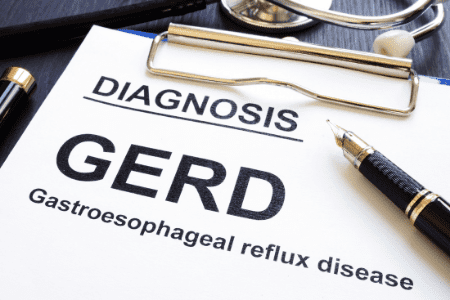- What is GERD?
- What are the symptoms of GERD?
- Why would I get GERD?
- How does my doctor diagnose GERD?
- What treatments can help my GERD?
If you have the type of long-term acid indigestion known as gastroesophageal reflux disease, or GERD, you’re certainly not alone. In fact, it’s much more common than you probably think, with researchers estimating that about 20% of the U.S. population suffers from it.
GERD isn’t the occasional heartburn you get from eating spicy foods, either. Instead, GERD is a more chronic condition affecting the digestive tract. If left untreated, it can cause serious complications.
Here is everything you need to know about GERD, including what symptoms to watch out for and, most importantly, how to get help.
What Is GERD?
GERD occurs when the contents of the stomach float upwards back into the esophagus. This causes a burning pain in the chest and can become quite uncomfortable. The condition may begin as a periodic heartburn that flares up after you eat certain foods. This type of occasional acid indigestion is known as GER, or gastroesophageal reflux.
When the symptoms become chronic, we add the “D” at the end, signifying a more chronic disease state. GERD is a long-lasting and severe condition with repeating symptoms that can cause complications over time.
Physically, GERD affects a ring of muscle that resides between your stomach and esophagus called the lower esophageal sphincter (LES). Think of the LES as a kind of trap door. Food and beverages slide down the throat and into the esophagus, traveling south toward the stomach, where it’s digested. After the food passes through the LES, it should shut, which keeps the food and stomach acids where they belong. If the LES relaxes when it shouldn’t, the stomach juices start to reflux, or travel back, returning up the esophagus.
You may be wondering what kind of serious complications can come from this phenomenon, and it all comes down to the stomach acid itself. When the contents of the stomach reflux, they damage the tissue lining the esophagus—damage that can become permanent in long-lasting, untreated GERD in adults, leading to severe inflammation and pain. This is why it’s important to recognize the symptoms of this condition as early as possible.
What Are the Symptoms of GERD?
 Heartburn, also called acid reflux, is the most common symptom of GERD. Heartburn feels like a burning pain in the center of your chest and moves into your neck and throat. This can leave a bitter, acidic taste in the mouth as well.
Heartburn, also called acid reflux, is the most common symptom of GERD. Heartburn feels like a burning pain in the center of your chest and moves into your neck and throat. This can leave a bitter, acidic taste in the mouth as well.
Acid reflux can put pressure on your chest that can make you worry you’re having a heart attack. Although, of course, you wouldn’t be feeling other symptoms of a heart attack, if you find yourself concerned, please seek medical help immediately.
You may experience heartburn symptoms that get worse after eating or if you exercise right after eating. In addition to chest pain, you may experience:
- A lump in your throat
- Bad breath
- Difficulty breathing
- Nausea or vomiting
- Regurgitation
- Sore throat
- Trouble swallowing
- Wearing of your tooth enamel
Heartburn can last into the night while you’re trying to sleep. If your acid reflux occurs at night, you may also experience:
- Asthma
- Coughing
- Insomnia
- Laryngitis
Children and even infants experience GERD more often than we initially thought. Your child may experience GERD symptoms that include:
- Bad breath
- Choking that wakes the child up
- Crying and not want to eat
- Problems sleeping after eating
- Small, frequent regurgitation
More than 75% of GERD sufferers also have asthma. However, we are not sure of the relationship between the two disorders. Asthma drugs make GERD symptoms worse, as well, although treating the GERD can help asthma symptoms abate.
GERD is a complex disease with a host of uncomfortable symptoms. What causes the disease?
Why Would I Get GERD?
There isn’t a single cause of GERD. The risk of you getting GERD varies. We know that GERD happens when the LES barrier is somehow compromised. The combination of factors contributing to GERD include stomach distention, delayed emptying of the stomach, or even too much acid produced in the stomach.
Some doctors believe that a hiatal hernia can cause GERD. A hiatal hernia is when the upper part of your stomach pushes through the diaphragm muscle and into the chest. However, only some, but not all people with hiatal hernias also have GERD.
Anyone can develop the condition. However, there are some conditions and lifestyle choices that doctors believe contribute to chronic GERD. This includes:
- Aging; if you’re over 40, the risk of GERD goes up
- Certain types of food as well as your eating habits
- Obesity or being overweight
- Pregnancy
- Smoking or even being exposed to smoke second-hand
- Taking certain medications
Understanding the difference between the occasional heartburn incident and GERD starts with a visit to your doctor.
How Does My Doctor Diagnose GERD?
 A consultation with your trusted medical provider can help you figure out if you have periodic heartburn (GER) or the more chronic form of the illness (GERD). Your doctor may discuss controlling your symptoms with medications and dietary changes. If GERD is suspected, you may have a number of tests, such as:
A consultation with your trusted medical provider can help you figure out if you have periodic heartburn (GER) or the more chronic form of the illness (GERD). Your doctor may discuss controlling your symptoms with medications and dietary changes. If GERD is suspected, you may have a number of tests, such as:
- Esophageal manometry uses sensors inserted through the nose to measure the strength of your LES and the esophageal muscles to move food
- Esophageal pH monitoring inserts a thin tube through your nose or mouth into the stomach for 24-hours to measure the pH of your GI tract as you sleep, eat, and live your life
- Upper gastrointestinal endoscopy/biopsy, where an endoscope, which is a long tube with a light on the end, goes through the mouth to look at your esophagus
- Upper GI series, where you drink a liquid called barium so that X-rays can be taken of your esophagus and throat
If you’re diagnosed with GERD, we have good news: There are both prescription and over-the-counter medications that are effective in helping manage its symptoms.
What Treatments Can Help My GERD?
GERD treatment is individualized, and your doctor will work closely with you to manage your symptoms. Some of the most common GERD medications include:
- Baclofen to reduce the relaxation of the LES
- H-2 receptor blockers to lessen the amount of acid produced by your stomach
- Over-the-counter antacids to neutralize the acid your stomach produces
- Proton pump inhibitors that can block acid but also heal damaged tissue in the esophagus
GERD is generally controlled by these types of medications. In some cases, surgery may be necessary.
No matter the stage of your GERD progression, the experienced team at Digestive Disease Consultants of Orlando is equipped to help you control your acid reflux and GERD symptoms. Schedule an appointment today to determine the right treatment plan and get you back to full health.
